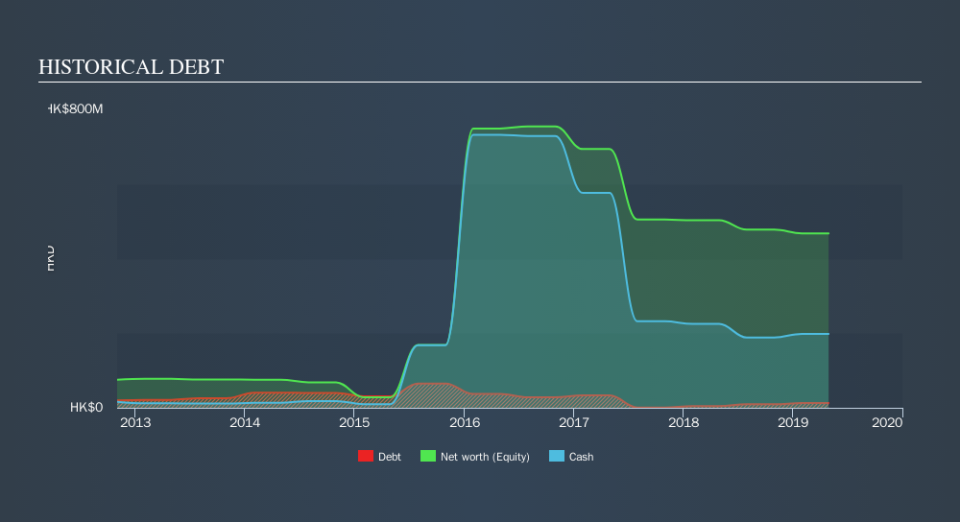Is QPL International Holdings (HKG:243) Using Too Much Debt?

The external fund manager backed by Berkshire Hathaway's Charlie Munger, Li Lu, makes no bones about it when he says 'The biggest investment risk is not the volatility of prices, but whether you will suffer a permanent loss of capital.' So it seems the smart money knows that debt - which is usually involved in bankruptcies - is a very important factor, when you assess how risky a company is. Importantly, QPL International Holdings Limited (HKG:243) does carry debt. But the more important question is: how much risk is that debt creating?
When Is Debt A Problem?
Debt and other liabilities become risky for a business when it cannot easily fulfill those obligations, either with free cash flow or by raising capital at an attractive price. In the worst case scenario, a company can go bankrupt if it cannot pay its creditors. However, a more usual (but still expensive) situation is where a company must dilute shareholders at a cheap share price simply to get debt under control. By replacing dilution, though, debt can be an extremely good tool for businesses that need capital to invest in growth at high rates of return. The first step when considering a company's debt levels is to consider its cash and debt together.
View our latest analysis for QPL International Holdings
What Is QPL International Holdings's Debt?
The image below, which you can click on for greater detail, shows that at April 2019 QPL International Holdings had debt of HK$12.3m, up from HK$5.20m in one year. But on the other hand it also has HK$198.2m in cash, leading to a HK$185.9m net cash position.
A Look At QPL International Holdings's Liabilities
According to the balance sheet data, QPL International Holdings had liabilities of HK$66.7m due within 12 months, but no longer term liabilities. On the other hand, it had cash of HK$198.2m and HK$129.9m worth of receivables due within a year. So it can boast HK$261.4m more liquid assets than total liabilities.
This luscious liquidity implies that QPL International Holdings's balance sheet is sturdy like a giant sequoia tree. On this view, it seems its balance sheet is as strong as a black-belt karate master. Simply put, the fact that QPL International Holdings has more cash than debt is arguably a good indication that it can manage its debt safely.
Fortunately, QPL International Holdings grew its EBIT by 7.4% in the last year, making that debt load look even more manageable. When analysing debt levels, the balance sheet is the obvious place to start. But it is QPL International Holdings's earnings that will influence how the balance sheet holds up in the future. So if you're keen to discover more about its earnings, it might be worth checking out this graph of its long term earnings trend.
But our final consideration is also important, because a company cannot pay debt with paper profits; it needs cold hard cash. QPL International Holdings may have net cash on the balance sheet, but it is still interesting to look at how well the business converts its earnings before interest and tax (EBIT) to free cash flow, because that will influence both its need for, and its capacity to manage debt. During the last three years, QPL International Holdings burned a lot of cash. While that may be a result of expenditure for growth, it does make the debt far more risky.
Summing up
While it is always sensible to investigate a company's debt, in this case QPL International Holdings has HK$186m in net cash and a strong balance sheet. On top of that, it increased its EBIT by 7.4% in the last twelve months. So we don't think QPL International Holdings's use of debt is risky. Even though QPL International Holdings lost money on the bottom line, its positive EBIT suggests the business itself has potential. So you might want to check outhow earnings have been trending over the last few years.
If you're interested in investing in businesses that can grow profits without the burden of debt, then check out this free list of growing businesses that have net cash on the balance sheet.
We aim to bring you long-term focused research analysis driven by fundamental data. Note that our analysis may not factor in the latest price-sensitive company announcements or qualitative material.
If you spot an error that warrants correction, please contact the editor at editorial-team@simplywallst.com. This article by Simply Wall St is general in nature. It does not constitute a recommendation to buy or sell any stock, and does not take account of your objectives, or your financial situation. Simply Wall St has no position in the stocks mentioned. Thank you for reading.

